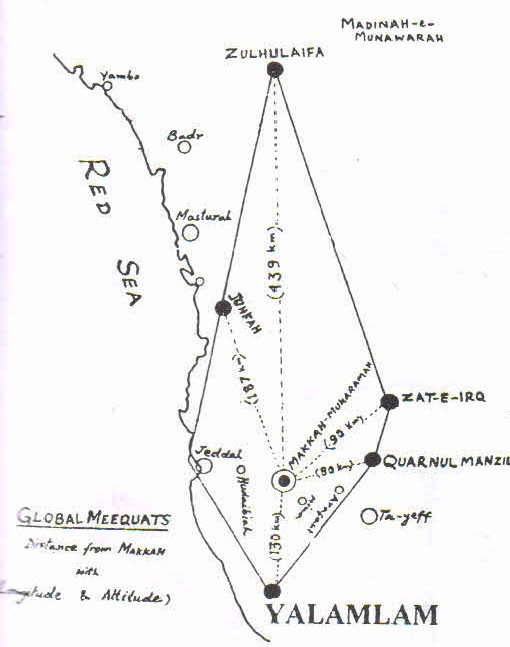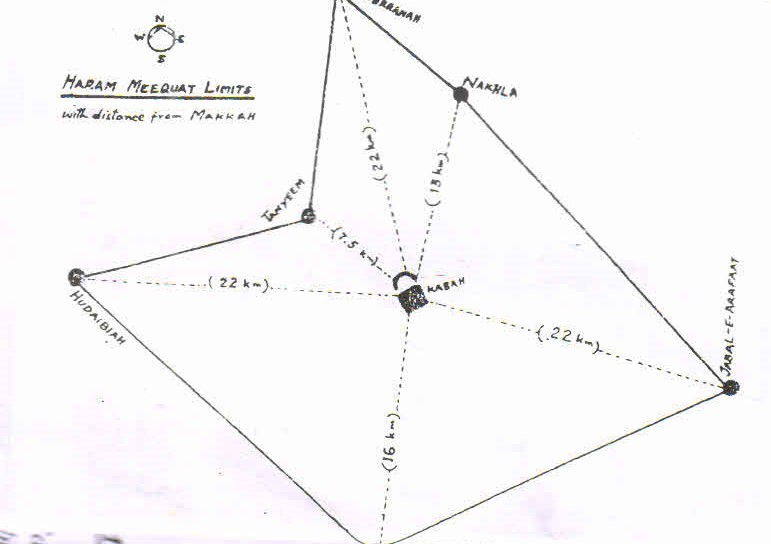Umrah

Umrah
The word Umrah is mentioned twice in verse (196) surah (2)
Baquar of the Holy Quran as follows.
Translation: And
Perform Haj and Umrah for Allah.
Translation: then
whosoever contenteth himself with Umrah for Haj
(shall give) such gifts as can be had with ease.
What
is Umrah
the literal meaning of Umrah in Arabic is to visit or intend to leave for a populated place. In Islamic terms, Umrah means to put on
Ehraam at Meequat and then to perform Tawaf-e- Ka’aba, sa” ee
Between Safa and Marwah, and finally to shave or trim the
head’s hair.
When
to Perform Umrah
1) It is
Sunnah-Mu-Akkad to perform Umrah once in a lifetime.
2) For an
Aafaqui (Non- resident of Makkah-e-Mukarramah) it is Makrooh-e- Tahreemi to
perform Umrah from the 9Th TO the 13Th of the month of Zilhijjah.
Except five-day Umrah may be performed by him throughout the year.
3) For a Makki (resident of Makkah-e-Mukarramah) it is Makrooh to perform Umrah during the month of hajj (ie 1st of shawwaal to 13th of Zilhijjah). He can perform Umrah for the rest of the year.
Virtues of Umrah: - Rassol-E-Akram: - Declared
1) Umrah
is a small haj.
2) Umrah
removes one’s indigence and sins just as a furnace removes the rust of silver
and gold.
3) Umrah
performed during the holy month of Ramazan, is Equal (in reward) to performing
Haj with me.
4) A person who left for performing Umrah and hajj and died on the way, he will be asked to enter Heaven without appearing in the divine court on the day of judgment and without any interrogation.
Fardh Items of Umrah: -
1) To put
on ehraam with niyyah for umrah followed by talbiah.
2) To
perform Tawaaf-e-ka’aba.
NB: - Umrah becomes null and void if any
fardh items are left off.
Wajib Items of Umrah: -
1) After
Tawaaf, perform sa’ee between Safa and Marwah, By Commencing it from Safa
and concluding it at Marwah.
2) To
shave or trim the head’s hair.
NB: - If any wajib item is
left off, then Umrah becomes incomplete unless and until it is compensated by
Damm which means to offer the sacrifice of goat, sheep, or one-seventh of cow or
camel within the jurisdiction of Haram-e- Shareef.
Major Acts of Umrah: - Major acts of Umrah in order are:
1) Ehraam
2) Niyyah
3) Talbiah
4) Tawaf-e-Kaaba
5) Two
Raka’ at namaz Wajibut- Tawaaf.
6) Drinking
Zam Zam
7) Sa’ee
and
8) Finally,
haircut.
What
is Ehraam: Ehraam means the state of the
pilgrim, when after Niyyah Certain Halaal (Permitted) things become Haraam (Forbidden) but generally two white cotton sheets or toweling
(min2 ½ x1 ¼ yards) without design, decoration or seam have
been named ehraam which male pilgrims have to put on at or before, Meequat.
NB: -For
a female pilgrim is no particular Ehraam she can continue her customary
season garments except her head must be fully covered by a scarf so that not a
single strand of her hair is exposed.
Whare
to Wear Ehraam:- Ehraam is put on, at or before Meequat which
are fixed boundaries surrounding the Haram of Makkah Mukarramah No pilgrims are permitted to go beyond the meequat without wearing the Ehraam.
Meequat for Different Countries: -


1) Meequat
for persons coming from Madina-Munawwara is Zul-Hulaifah (or) Beir -e-Ali)
Which is about 439 km north of Makkah Mukarramah.
2) Meequat for Iraqis and countries in
its direction is Zaat-e-irq which is about (90) km northeast of Makkah
Mukarramam.
3) Meequat for pilgrims coming from
Syria and countries in its direction is juhfah (or Rabigh) which is about 187
km northwest of Makkah Mukarramah.
4) Meequat for Najdees and its direction
is Qarnul Manaazil a mountain about km east of Makkah Mukarramah.
5) Meequat for yamanis and countries in its direction as subcontinent About 130 km south of Makkah Mukarramah.
NB: - Meequat for persons who are within Haram-e- Shareef is the boundary as tanyeem or Je- Erranah at 7.5 Km and 22 km respectively from Masjid-e-Haram.
Muhrim And Restraction For Muhrim: - from the time one says the niyyah, utters talbiah, and wears Ehraam till he completes Umrah, he is called Muhrim a Mohrim must strictly abstain the following.
A) Restriction common to both males and females.
1) Covering
face with a cloth.
2) To pare
nails and shave, cut, trim, or clip hair from the body.
3)
Using of it, scent, perfume, and everything which has
fragrance just as fragrant soap toothpaste.
4) Wearing flower garland and eating
Loung Elachi, Musk, saffron, etc.
5) Killing lice or removing them from the
body hair.
6) Intercourse with wife or any things relating to and leading towards it as kissing embracing touching her physically with sexual
passion and even discussing any sexual topic verbally.
7) Quarrelling and using vulgar
language.
8) Hunting wildlife and land animals
chasing game or aiding a hunter in any way within Hill and Haram area.
9) Cutting any tree (or grass) from the soil of Haram.
NB: - Last two restrictions are imposed whether Ehraam is put on or not.
B)
Additional Restriction to Males only.
1) Cover the Head with a cloth.
2) Wearing sewen garments such as an inner vest,
underwear, gloves, socks, etc.
3)
Using footwear that covers the first metatarsals (Mounted foot bone).
NB: - Females are free from these three restrictions.
Act Permitted for Muhrim: -
1) Talking a bath without removing dirt
deposited on the body.
2) Wearing a ring on your fingers.
3) Looking into a mirror.
4) Using miswaak to clean teeth.
5) Using odorless surma.
6) Extracting a tooth.
7) To separate a broken nail.
8) To circumcise.
9) To Itch or rub the body gently by taking
care that no hair falls on the body.
10) To slaughter a domestic animal such as a cow, camel, sheep, goat, or poultry.
11) Killing of animals and insects such as
croes, snakes, fleas, scorpions, bugs mosquitoes, flies, cockroaches, lizard
chameleons rat kites, etc which are harmful.
12) To go angling or fishing marine life.
13) Ro tying Himyaani (money belt) around
the waist.
14) To put on footwear that does not
cover the first metatarsals ( the mounted bone ) of the feet,
15) To perform Nikah Ceremony.
Kind
of violation and Jinaayaat (penalties): - Jinaayaat (penalties) in
umra is applicable as per the nature of the violation. They are named as follows.
Damm: it
means the sacrifice of a goat, sheep, or one-seventh part of a cow or camel in
various cases.
Sadaquah:
it
means giving a wheat amount equal to sasaquah-e-fitr about 1 ¼ kg or its value)
Small
Sadaquah: It means giving a handful of grain or its value or one piece
of bread.
NB: - Damm, is permitted only within the limits of haram
whereas sadaquah or its value may be given any whare. One giving Damm, must not
consume its meat. It must be given to the needy deserved person.
Muhrim’s violations and penalties: -
1) A
penalty of Damm for male or female while covering one-fourth or full face
continuously for twelve hours or more, otherwise sadaquah for covering the face for
less than twelve hours.
2) Damm
for paring five nails of hand or foot or all the twenty nails of hands and feet
together, otherwise sadaquah for paring less than five nails of any hand or
foot.
3) Daam for removing one-fourth of any or more hair of the head or beard by any means, otherwise sadaquah for removing hair less than that.
Similarly, Damm for removing all the hair
from the full neck or one armpit, or below the navel (private parts), otherwise
sadaquah for less than that.
4) If hair is trimmed or shaved or burnt while cooking, or dropped while performing wudhu (ablution), or scratching or combing then small sadaquah for each hair up to the limit of three hairs and sadaquah for more than three hairs.
NB: - No penalty if hair falls itself without touching the hand.
5) Damm
if one perfumes much at a major part of the body as head, face, shine, etc.
6) If one kills a louse at his own body or clothes or by throwing away or washes the cloths, so that the lice may die, then a piece of bread otherwise handful wheat for two or three lice and full sadaquah for more.
7) a) Damm from a male and female both touching each other, with shahwat (lechery) or embracing or kissing even though no seminal discharge takes place of course three is no penalty upon the male for a wet dream.
(b) intercourse in Umrah before Tawaaf makes Umrah null and void. In such a case, Quaza Umra is to be performed after Damm.
(C) Damm is waajib for intercourse after Tawaaf but before sa’ee or before haircut. It will rectify the Umrah.
8) if one enters Makkah Mukarramah crossing over the
Meequat without Ehraam then he has to return to the Meequat and put on Ehraam. At Makkah Mukarramah.
9) if one performs all Manasik (rites) of Umrah except
hair-cut and puts on Ehraam for another Umrah, then he is a sinner and he has to
give damm also.
10) Damm for males who wear sewn, knitted, or woven clothing
for twelve hours or more, otherwise sadaquah for lesser time.
11) Damm for males using footwear that covers the first
metatarsals
(mounted bone) of the
foot for twelve hours or more, otherwise Sadaquan for lesser time.